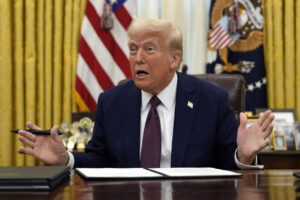One of Hong Kong’s biggest pro-democracy groups, the Civic Party, has voted to disband following a crackdown on dissent by China.
Founded in 2006, it was once the second-largest opposition party in the city’s Legislative Council.
But several of its key members were arrested or fled into exile in recent years.
One of its founders said the party’s end was “a symbol of the end of Hong Kong’s nativistic democracy movement”.
Speaking to the AFP news agency, Albert Lai said “the failure does not mean the movement was meaningless.”
The party announced plans to dissolve in December after it failed to form a new executive committee.
At the time, chairman Alan Leong told the Hong Kong Free Press he was not surprised nobody wanted to lead the party as there had been no suggestions about how to keep it going at an internal member in September.
On Saturday, Mr Leong said all members had voted to disband the party, with one person abstaining.
“After going through the last procedure, the Civic Party will disappear from the Earth,” he said.
In a statement, Mr Leong thanked “all like-minded people” who had joined the party on its “long walk to democracy” and said that while it had “not accomplished what we set out to do, there is a time for everything”.
The Civic Party was known for representing professionals including lawyers and accountants and was seen as a more moderate alternative to the larger Democratic Party, which is still running.
Several members have faced prosecution for taking part in the pro-democracy protests against Beijing’s control, which began in 2019.
Following the introduction of the controversial national security law, four of its lawmakers were ousted from the Legislative Council in 2020, accused of being “unpatriotic”.
This triggered mass resignations from other opposition politicians in protest.
Some members also took part in unofficial political elections and were charged with conspiracy to subversion. They went on trial with more than 40 others in February.
Following an overhaul of Hong Kong’s electoral system that meant only “patriots” could hold public office, the party lost dozens of spots on district councils.
Hong Kong is a Special Administrative Region of China. Under its “one country, two systems” principle, residents are supposed to enjoy certain freedoms unavailable on the mainland – and Hong Kong’s mini-constitution, the Basic Law, guarantees the right to public assembly.
But these rights have, critics say, been eroded since 2020, when Beijing imposed a national security law in response to widespread pro-democracy protests.
Beijing said the law was needed to bring stability to the city – but critics believe it was designed to squash dissent and weaken Hong Kong’s autonomy.
Source : BBC










